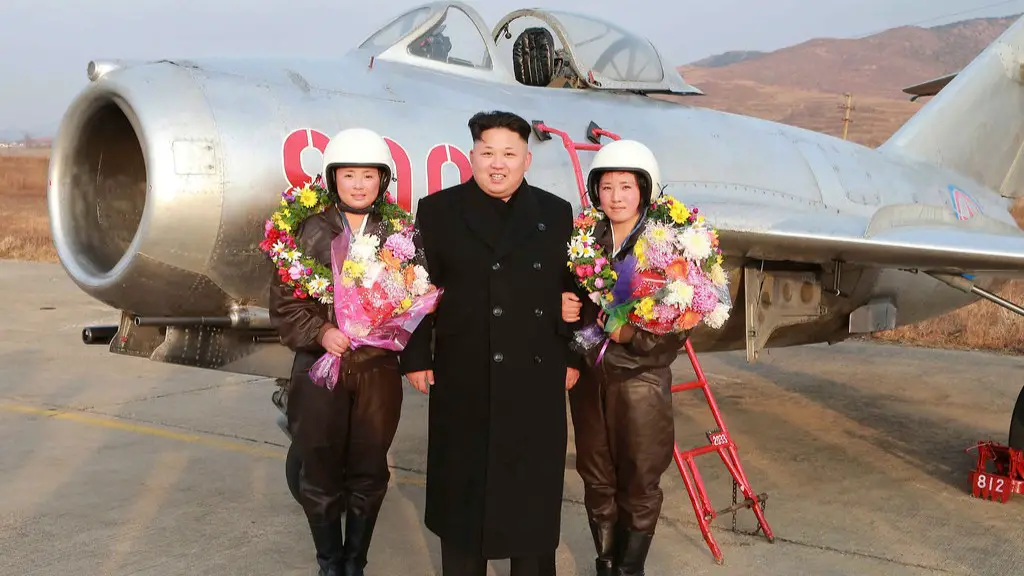Why North Korea Hates The United States
North Korea’s antagonism towards the United States and its allies is a long-standing affair, one characterized by much bloodshed, suffering, and hate. North Koreans seem to believe that the US is a threatening and interference force in the East Asian region, an entity which actively seeks to stamp out their way of life.
Historically speaking, North Korea’s distaste for the US dates back to the Korean War (1950-1953). Between 1950 and 1953, the United States waged a devastating campaign against the North Korean people. While the war eventually ended in a stalemate, the toll it had taken on the population was severe—some estimate that around 3 million people died in the conflict. This history of bloodshed and suffering has undoubtedly left a bitter taste in the mouths of many North Koreans.
Additionally, with the US-led containment efforts of the Cold War era, North Korea’s sense of hatred towards the US only grew more intense. For example, since the 1950s, the US and its allies have implemented a number of policies such as economic sanctions and military exercises with the goal of limiting North Korea’s influence in East Asia. These moves were seen by Pyongyang as a direct attack on their sovereignty and a mechanism to hinder their growth.
In recent years, the situation has become increasingly tense due to North Korea’s growing nuclear arsenal. Many US policymakers and experts see North Korea’s nuclear program as a serious threat to international security, a factor which has only further strained North Korea’s relationship with the US. Fiscal year 2018 also saw an alarming deployment of US military weapons, including tactical nuclear weapons and advanced radar systems in South Korea, a move seen by many as a direct provocation against Pyongyang. It has further exacerbated the hostility from North Korean side. From Pyongyang’s point of view, these additional moves are simply another instance of the US. intruding into their affairs.
Why North Korea Hates The United States: Nuclear Weapons and Proliferation
The relationship between North Korea’s nuclear arsenal and the US has been particularly contentious. Although the US is keen to see North Korea’s denuclearization, Pyongyang is determined to pursue its nuclear ambitions. North Korean leaders, such as Kim Jong Un, have often been quoted as believing that nuclear weapons are necessary to protect their nation against the US and its allies.
US experts have also long been concerned about North Korea’s proliferation activities overseas. North Korea has sold its nuclear and ballistic missile technology to hostile states such as Iran and Syria, and the US is worried that this could lead to proliferation of advanced weaponry in the Middle East.
Additionally, the US has placed a number of economic sanctions on North Korea due to its nuclear program. These sanctions have had a devastating effect on the North Korean economy, further fueling mistrust and animosity towards the US.
Politics and Ideological Apprehensions
Political and ideological apprehensions are also an important factor in North Korea’s disdain for the US. Kim Jong-un and the North Korean leadership have routinely accused the US of interfering in their affairs and attempting to “subvert” their decisions.
At the same time, North Korea has also long been seen as an authoritarian, totalitarian state which violates basic human rights such as freedom of speech and assembly. The US has on multiple occasions voiced its disapproval of Pyongyang’s myriad oppressive policies. This has only further aggravated North Korea’s rage against the US.
The US government has also long been vocal in its opposition to North Korea’s ballistic missile tests, which have been conducted in spite of international condemnation. This has further heightened tensions between the two nations, as North Korea sees US interference as a direct strike to their autonomy.
Propaganda and Perception
North Korean propaganda has played an important role in shaping the way North Korean citizens view the US. State media often paints the US in a negative light, as a malicious and threatening entity which actively seeks to undermine the North Korean government. These views have been further reinforced by Pyongyang’s own leadership, as Kim Jong-un and other senior officials often make incendiary comments about the US.
Contrarily, North Korean propaganda often portrays US allies, such as South Korea, in a positive light—they are viewed as benevolent and sympathetic towards North Korea’s plight. This has led to a perception among North Korean citizens that the US is bent on war and destruction whereas South Korea is peaceful and friendly to North Korea.
It is worth noting that North Korea’s views of the US are in no way representative of the views of the entire population. Although North Korea is an authoritarian state, many citizens there have voiced their own opinions about the US genocide, war crimes in the Middle East and elsewhere, and other issues.
North Korea’s Rationale For Its Animosity
Ultimately, it is difficult to generalize the North Korean state’s feelings towards the US. However, it is clear that Pyongyang’s animosity is rooted in a complex mixture of historical, political, and ideological factors. For North Korea, the US is seen as an interference force which seeks to limit the regime’s power and influence. North Korea’s belief that US’ policies towards them are a threat to their way of life has undoubtedly hindered the relationship between the two entities.
Social Dynamics in Contemporary North Korea
Despite the regime’s staunch stance and rhetoric, opinions on the US among North Korea’s citizens have become increasingly nuanced. Growing access to foreign media and technology, as well as increased economic activities between the two nations, have allowed for the emergence of diverse views on the US.
For example, a number of North Korean entrepreneurs have actively sought out business opportunities in nearby countries such as China, with the ultimate goal of exporting commodities back to North Korea. This, in turn, creates more business opportunities for citizens in the North. Conversely, a number of international NGOs and humanitarian organizations have also been actively working in North Korea in order to provide aid and assistance.
Furthermore, North Koreans have increasingly used social media platforms such as Twitter and YouTube in order to express their ideas and engage with individuals outside North Korea. This has led to an increased awareness of US culture and politics among North Koreans, and possibly a new perspective on the US-North Korean relationship.
Implications of US-North Korea Relations
The hostility between the US and North Korea has clear implications for international security and global politics. North Korea’s repeated missile tests, coupled with its nuclear weapons arsenal and expansive ballistic missile program, have sparked fears of a possible conflict in the region. On the other hand, efforts to denuclearize North Korea have been complicated by the nation’s refusal to come to the negotiating table with the US and its allies.
In addition, US sanctions on North Korea have had a debilitating effect on the already unstable economic situation in the country. This has further fueled tensions between the two rivals, as North Korea sees US sanctions as a hindrance to their economic growth.
The US has also clashed with North Korea over issues such as human rights and the freedom of information. North Korea has long been seen as one of the world’s most oppressive regimes, and US policymakers’ statements on the country’s human rights abuses have done little to improve Pyongyang’s view of the US.
The Way Forward
While the US and North Korea are unlikely to be reconciling anytime soon, it is clear that both sides must strive for better communication and greater understanding. Improving US-North Korea relations requires a sustained commitment to diplomacy and increased communication. This may involve direct talks between the two parties and other countries in the region, as well as economic and humanitarian aid measures for the North Korean people. Additionally, the US should prioritize human rights issues and make it clear that it values the human rights of North Korean citizens.
It is also worth noting that, despite their differences, the US and North Korea do have shared interests. For example, there have been efforts from both sides to resolve the Korean Peninsula crisis, which is a pressing issue for all parties in the region. Ultimately, both sides must find common ground in order to move forward and foster better relations.





